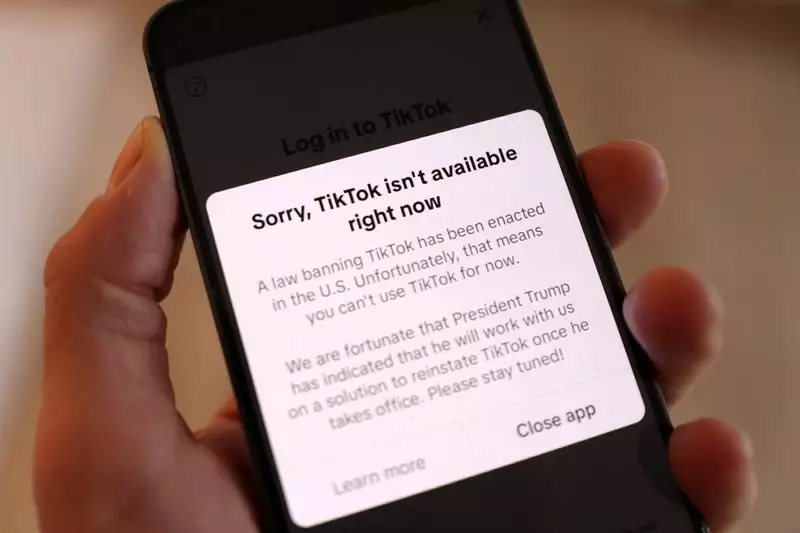TikTok has become a cultural phenomenon, captivating approximately half of all Americans during its relatively short existence. However, the platform has found itself amidst a turbulent political landscape, particularly with regards to national security concerns involving its Chinese ownership. As the threat of a ban loomed large over the social media app, reactions from various stakeholders revealed the intricate connections between technology, politics, and cultural expression. In the wake of this upheaval, one must examine not just the immediate implications of a potential TikTok shutdown, but also its long-term effects on users and the broader social media ecosystem.
A Sudden Disruption: The Impacts of Legislative Action
Late on a Saturday night, TikTok ceased operations for its 170 million American users, coinciding with the enactment of a law geared toward curtailing its operations over national security issues. President-elect Donald Trump’s urgent post on Truth Social, calling to “SAVE TIKTOK!”, indicated not only the critical nature of the situation but also the political maneuvering surrounding it. Trump’s prediction of a potential 90-day reprieve for TikTok highlighted a significant, albeit temporary, reprieve for the platform’s users and businesses reliant on it.
This abrupt discontinuation was unprecedented in U.S. history, as no major social media platform had ever been effectively shut down in such a manner due to legislative action. In a market dominated by free expression and innovation, TikTok’s ban opened a Pandora’s box of implications, not only affecting the app’s operations but also reverberating throughout U.S.-China relations and the future of digital space.
The economic ramifications of TikTok’s shutdown were immediate and profound. Small businesses that had leveraged the platform for marketing and engagement found themselves scrambling for alternatives. As users began migrating to competitor applications, such as the emerging China-based platform RedNote, the landscape seemed poised for disruption. Major players like Meta and Snap reportedly saw a surge in their stock values, signaling investor optimism over the potential influx of TikTok users and associated advertising revenue.
Yet, the emotional exhaustion among TikTok users was palpable. Posts expressing sadness over lost connections, friendships, and creative outlets flooded alternative platforms like X (formerly Twitter). Users branded themselves as “TikTok refugees,” resonating with many who felt a genuine loss with the app’s sudden inaccessibility. This highlights not only the economic significance of these platforms, but also the profound personal connections they foster, making the ban a deeply felt communal experience.
The Biden administration’s stance on TikTok framed the issue as one requiring the incoming Trump administration to undertake decisive action. Press Secretary Karine Jean-Pierre’s statements suggested a degree of political strategy in the government’s handling of the situation, laying the groundwork for the expectancy of a solution post-inauguration. Meanwhile, the Chinese government categorically condemned the ban, pointing to unfair practices in targeting TikTok as an emblem of broader tensions between the two nations.
This international dimension complicates the narrative surrounding TikTok, as focus shifts beyond national security into questions of fairness, regulation, and the rights of businesses impacted by geopolitical standoffs. Public sentiment increasingly questions the motivations behind legislative actions, which appear to straddle the line between genuine security fears and protectionist undercurrents aimed at curtailing foreign competition.
As the dust settles from the chaos, questions linger on TikTok’s future in the American landscape. While rumors swirl of potential acquisitions and buyouts, such as interest purportedly expressed by influential figures like Elon Musk, the app’s uncertain trajectory leaves many wondering if a return to its former prominence is attainable.
TikTok’s CEO, Shou Zi Chew, attending the inauguration alongside Trump indicated an ongoing relationship between the platform and the impending administration. This possibility of negotiation and a political resolution offers a glimmer of hope to users and stakeholders affected by the sudden disruption, but also raises concerns about the viability of government intervention in determining the fate of private companies based on international relations.
Ultimately, as crucial decisions unfold, both TikTok and the countless users who utilize it for economic opportunities and creative expression are left navigating a complex interplay of technology, politics, and culture. Will TikTok find a pathway to reinstatement, or will it forever signal a shift in how social media is regulated and perceived in the United States? For many, the app’s future is not just a matter of political maneuvering, but an integral part of how they connect, create, and thrive in an increasingly digital world.

